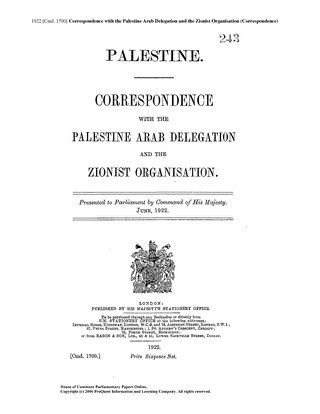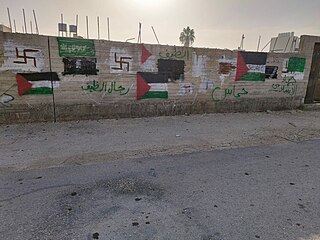Related Research Articles

Mohammed Amin al-Husseini was a Palestinian Arab nationalist and Muslim leader in Mandatory Palestine. Al-Husseini was the scion of the al-Husayni family of Jerusalemite Arab nobles, who trace their origins to the Islamic Prophet Muhammad.

The Churchill White Paper of 3 June 1922 was drafted at the request of Winston Churchill, then Secretary of State for the Colonies, partly in response to the 1921 Jaffa Riots. The official name of the document was Palestine: Correspondence with the Palestine Arab Delegation and the Zionist Organisation. The white paper was made up of nine documents and "Churchill's memorandum" was an enclosure to document number 5. While maintaining Britain's commitment to the Balfour Declaration and its promise of a Jewish national home in Mandatory Palestine, the paper emphasized that the establishment of a national home would not impose a Jewish nationality on the Arab inhabitants of Palestine. To reduce tensions between the Arabs and Jews in Palestine the paper called for a limitation of Jewish immigration to the economic capacity of the country to absorb new arrivals. This limitation was considered a great setback to many in the Zionist movement, though it acknowledged that the Jews should be able to increase their numbers through immigration rather than sufferance.

The 1920 Nebi Musa riots or 1920 Jerusalem riots took place in British-controlled part of Occupied Enemy Territory Administration between Sunday, 4 April, and Wednesday, 7 April 1920 in and around the Old City of Jerusalem. Five Jews were killed and several hundred injured; four Arabs were killed, and eighteen injured; 7 Britons were injured. The riots coincided with and are named after the Nebi Musa festival, which was held every year on Easter Sunday, and followed rising tensions in Arab–Jewish relations. The events came shortly after the Battle of Tel Hai and the increasing pressure on Arab nationalists in Syria in the course of the Franco-Syrian War.

The Jaffa riots were a series of violent riots in Mandatory Palestine on May 1–7, 1921, which began as a confrontation between two Jewish groups but developed into an attack by Arabs on Jews and then reprisal attacks by Jews on Arabs. The rioting began in Jaffa and spread to other parts of the country. The riot resulted in the deaths of 47 Jews and 48 Arabs, with 146 Jews and 73 Arabs wounded.

Jamal al-Husayni (1894–1982), was born in Jerusalem and was a member of the highly influential and respected Husayni family.

Musa Kazim Pasha al-Husayni held a series of senior posts in the Ottoman administration. He belonged to the prominent al-Husayni family and was mayor of Jerusalem (1918–1920). He was dismissed as mayor by the British authorities and became head of the nationalist Executive Committee of the Palestine Arab Congress from 1922 until 1934. His death was believed to have been caused by injuries received during an anti-British demonstration.

The Haycraft Commission of Inquiry was a Royal Commission set up to investigate the Jaffa riots of 1921, but its remit was widened and its report entitled "Palestine: Disturbances in May 1921". The report blamed the Arabs for the violence, but identified a series of grievances concerning the way their interests were apparently being subsumed to the interests of the Jewish immigrants, who were then around 10% of the population and increasing rapidly. Some measures to ease Arab unhappiness were taken, but Jewish communities were helped to arm themselves and ultimately the report was ignored. Publishing it was considered a propitiatory measure.
The Palestinian people are an ethnonational group with family origins in the region of Palestine. Since 1964, they have been referred to as Palestinians, but before that they were usually referred to as Palestinian Arabs. During the period of the British Mandate, the term Palestinian was also used to describe the Jewish community living in Palestine.

During the British rule in Mandatory Palestine, there was civil, political and armed struggle between Palestinian Arabs and the Jewish Yishuv, beginning from the violent spillover of the Franco-Syrian War in 1920 and until the onset of the 1948 Arab–Israeli War. The conflict shifted from sectarian clashes in the 1920s and early 1930s to an armed Arab Revolt against British rule in 1936, armed Jewish Revolt primarily against the British in mid-1940s and finally open war in November 1947 between Arabs and Jews.
Muslim supporters of Israel refers to both Muslims and cultural Muslims who support the right to self-determination of the Jewish people and the likewise existence of a Jewish homeland in the Southern Levant, traditionally known as the Land of Israel and corresponding to the modern polity known as the State of Israel. Muslim supporters of the Israeli state are widely considered to be a rare phenomenon in light of the ongoing Israeli–Palestinian conflict and the larger Arab–Israeli conflict. Within the Muslim world, the legitimacy of the State of Israel has been challenged since its inception, and support for Israel's right to exist is a minority orientation. Pro-Israel Muslims have faced opposition from both moderate Muslims and Islamists.
Army of Shadows: Palestinian Collaboration with Zionism, 1917–1948 is a book published in 2004 by Hillel Cohen. It is about the sale of land and other co-operation between Arabs and Jews in Palestine before the establishment of the State of Israel.

Events in the year 1935 in the British Mandate of Palestine.

Racism in the Palestinian territories encompasses all forms and manifestations of racism experienced in the Palestinian Territories, of the West Bank, Gaza, and East Jerusalem, irrespective of the religion, colour, creed, or ethnic origin of the perpetrator and victim, or their citizenship, residency, or visitor status. It may refer to Jewish settler attitudes regarding Palestinians as well as Palestinian attitudes to Jews and the settlement enterprise undertaken in their name.

Hassan Bey Shukri was the mayor of Haifa and the president of the Muslim National Associations.
Sheikh Musa Hadeib was the head of Mount Hebron farmers' party and a founder of the Zionist-supported Muslim National Associations. He was from the village of Dawaymeh near Hebron.

Mandatory Palestine was a geopolitical entity that existed between 1920 and 1948 in the region of Palestine under the terms of the League of Nations Mandate for Palestine.
This is a timeline of intercommunal conflict in Mandatory Palestine.

The 1948 Palestine war was fought in the territory of what had been, at the start of the war, British-ruled Mandatory Palestine. During the war, the British withdrew from Palestine, Zionist forces conquered territory and established the State of Israel, and over 700,000 Palestinians fled or were expelled. It was the first war of the Israeli–Palestinian conflict and the broader Arab–Israeli conflict.

Palestinian nationalism is the national movement of the Palestinian people that espouses self-determination and sovereignty over the region of Palestine. Originally formed in the early 20th century in opposition to Zionism, Palestinian nationalism later internationalized and attached itself to other ideologies; it has thus rejected the occupation of the Palestinian territories by the government of Israel since the 1967 Six-Day War. Palestinian nationalists often draw upon broader political traditions in their ideology, such as Arab socialism and ethnic nationalism in the context of Muslim religious nationalism. Related beliefs have shaped the government of Palestine and continue to do so.
References
- 1 2 3 Huneidi, Sahar (2001). A Broken Trust: Sir Herbert Samuel, Zionism and the Palestinians 1920–1925. London: I.B. Tauris. p. 173. ISBN 1-86064-172-5.
- ↑ Hassassian, Manuel (2005). "Development of the Palestinian National Movement 1919–1939". In Scham, Paul (ed.). Shared Histories: A Palestinian-Israeli Dialogue. Walnut Creek, Calif: Left Coast Press. p. 98. ISBN 1-59874-013-X.
- ↑ The Tangled Truth, by Benny Morris, The New Republic; 7/5/08[ clarification needed ]
- ↑ Cohen, Hillel Army of Shadows: Palestinian collaboration with Zionism, 1917–1948 . Berkeley: University of California Press, 2009. p. 15–17